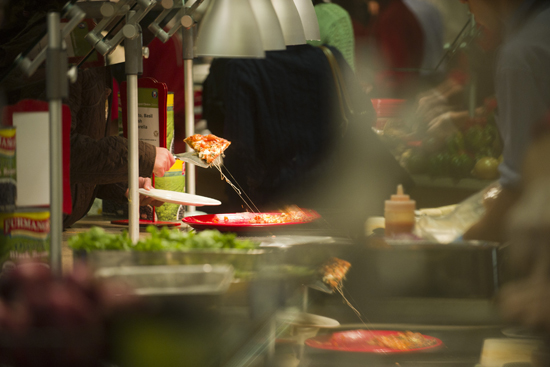The Good News? The Freshman 15 Is a Myth
The bad news? The graduation gain is not

A BU nutrition expert says that gaining weight doesn’t have to be part of the college curriculum. Photo by Cydney Scott
Nutrition and healthy eating expert Joan Salge-Blake (SAR’84), a Sargent College clinical associate professor, is the author of Nutrition & You; Nutrition & You: Core Concepts to Good Health & Nutrition; and Nutrition: From Science to You. In 2009, she was named the Annie Galbraith Outstanding Dietician and the Outstanding Dietetic Educator by the Massachusetts Dietetic Association.
Incoming college freshmen may be relieved to know that research supporting the idea that the average college freshman gains 15 pounds is slim and that such a weight gain is not a given. In fact, some research suggests that the Freshman 15 is a myth, since weight gain either didn’t occur at all or didn’t occur in the majority of college students studied. Other studies found that some students gained weight, but on average it was less than five pounds.
The problem may not be the freshman year, but rather the cumulative years during college. A 2011 study of more than 7,000 college students published in Social Science Quarterly found that these students gained on average only 2.5 to 3.5 pounds during their freshman year. The research did find, however, that over the course of four years at college, on average the women gained approximately 9 pounds and the men 13 pounds. While this amount of weight isn’t earth-shattering, obese adolescents are unfortunately more likely to become obese adults.
“College can be an ideal time to not only educate students about nutrition and positive lifestyle habits, but also be a supportive environment whereby healthy foods are accessible and physical activity is encouraged,” says Patricia K. Smith, a University of Michigan economics professor and one of the study authors.
Certain “elective” behaviors, such as eating when stressed and eating junk foods, have been shown to be associated with weight gain, but gaining weight doesn’t have to be part of your college curriculum.
The list of Dos and Don’ts below will help you avoid some of the potential pitfalls of college life:
- Do get enough sleep. It’s not surprising that studies show that college students often fall short in the sleep department. Insufficient sleep can cause an increase in the hunger-promoting hormone ghrelin and a decrease in the hunger-suppressing hormone leptin. Naps are an excellent way to catch up on lost sleep.
- Don’t skip breakfast. Research suggests that adolescents who don’t eat breakfast have an increased risk of becoming overweight or obese. If you skip this important meal, odds are you will be hungry later on in the morning and more likely to find yourself impulsively snacking on high-calorie food from a vending machine or college convenience store. Rise and dine on a bowl of high-fiber, whole-grain cereal with skim milk. Add some protein, such as string cheese or a handful of nuts, to help you through the morning.
- Do walk off your stress. A major lifestyle change, such as going off to college, can be stressful initially. When you feel wound up, lace up your sneakers and release some of the emotional stresses of college life on the walking path around campus or on the treadmill rather than in the dining hall.
- Don’t study with the microfridge. If studying at night causes you to munch, don’t study in your room surrounded by your roommate’s chips and other snacks piled high in the dorm refrigerator. Study at the campus library, where eating is prohibited.
- Do make sure fruits and veggies are a part of all your meals. Eating a salad or vegetable soup before your lunch or dinner has been shown to help cut back on the calories consumed at the meal. How? Fruits and vegetables will “fill you up before they fill you out,” so they are kind to your waist.
- Don’t drink your calories. A 20-ounce bottle of soda, sports drink, or energy drink can pack over 250 calories. Drink low-fat or skim milk with your meals and water (zero calories) in between.
Joan Salge-Blake can be reached at salge@bu.edu; follow her on Twitter at @joansalgeblake and read her weekly column, “Nutrition and You,” on Boston.com.
Comments & Discussion
Boston University moderates comments to facilitate an informed, substantive, civil conversation. Abusive, profane, self-promotional, misleading, incoherent or off-topic comments will be rejected. Moderators are staffed during regular business hours (EST) and can only accept comments written in English. Statistics or facts must include a citation or a link to the citation.